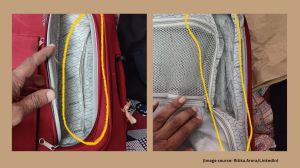Beethoven’s DNA reveals clues about his health, death and infidelity in family
Researchers have used five matching locks of hair from celebrated composer Ludwig Van Beethoven to sequence his genome for the first time. In the process, they have discovered clues about his health, death and even the possibility of an extramarital child in his parental lineage.
 A painting of Ludwig van Beethoven by Joseph Karl Stieler, 1820. (Image credit: WikiCommons)
A painting of Ludwig van Beethoven by Joseph Karl Stieler, 1820. (Image credit: WikiCommons)An international team of researchers have used five matching locks of hair from celebrated composer Ludwig Van Beethoven to sequence his genome for the first time.
While doing so, they have discovered clues about his health and also questions about whether there was an “extra-pair paternity event” in his family tree—a fancy way to say that some of the people in his family tree were born out of wedlock. Also, a famous lock of hair that was believed to have been the composer’s turned out to be fake.
The Beethoven Genome project
In a letter Beethoven wrote in 1802, famously known as the Heiligenstadt Testament, he made a written request that the causes of his illnesses be described after his death and that they are made public.
In order to shed light on the composer’s health problems, researchers embarked on what they call “The Beethoven Genome Project.” It began as a small venture in 2014 and over the course of the last eight years, it grew into a massive undertaking, producing a research paper with 32 co-authors from 11 institutions.
“Our primary aims were to establish the feasibility of sequencing a genome from small quantities of historical hair, to acquire and authenticate locks of hair attributed to Beethoven, to sequence Beethoven’s authentic genome to high-coverage, and to then assess Beethoven’s predisposition for heritable diseases, and search for any signs of infections, with eventual ancillary goals which ended up including analyses of genealogy and ancestry. In that order,” Tristan Begg, lead author of the article published in Current Biology, told indianexpress.com over email. Begg is a PhD scholar at the University of Cambridge.
Beethoven’s health issues and his death
Beethoven famously began going deaf in his mid to late-20s before he eventually became functionally deaf by 1818. Apart from investigating this using genome sequencing, the team also set out to look at any possible genetic causes of the many gastrointestinal problems he complained of.
Liver disease
While they were unable to find a definitive cause for the hearing loss and the gastrointestinal problems, they did discover significant risk factors for liver disease. They also found evidence that Beethoven contracted a Hepatitis B infection towards the last months before his final illness. According to the US Centers for Disease Control and Prevention (CDC), Hepatitis B is spread when bodily fluids from one person enter another. This could be blood, semen or any other bodily fluid.
According to Begg, Beethoven consumed alcohol regularly, but it is difficult to estimate the amounts he consumed. Many of the composer’s contemporaries claimed that his consumption was moderate by 19th Century Viennese standards, but there are disagreements between these sources. If his alcohol consumption was sufficiently heavy over a long period of time, it could have exacerbated his liver condition along with hepatitis B
Beethoven’s hearing loss
The cause of his hearing loss, however, remains even more mysterious. The genome sequencing of his hair samples did not reveal a simple genetic origin for his hearing loss. But according to Axel Schmidt, co-author of the research paper, it is still possible that the composer’s genome will reveal hints about the cause of his hearing loss in the future. Schmidt works at the Institute of Human Genetics at the University Hospital of Bonn.
Beethoven’s gastrointestinal issues
Beethoven had complained about many gastrointestinal issues during his lifetime but the researchers found that both coeliac disease and lactose intolerance were highly unlikely causes based on his genomic data. Also, the composer’s genetics suggested that he had a certain degree of genetic protection against irritable bowel syndrome, making that an even less likely explanation.
Beethoven’s death
According to co-author Johannes Krause, it is not yet possible to say exactly what killed the composer, but they were already able to confirm infection with Hepatitis B. They were also able to eliminate many of the other plausible genetic clauses. Krause works at the Max Planck Institute of Evolutionary Anthropology.
Begg believes it is likely that a combination of these factors together with his alcohol consumption, could have led to his death. It is now up to future researchers to find out how much each factor contributed.
Possible infidelity in the Beethoven family
“In the run up to sequencing Beethoven’s genome, my PhD advisor, Toomas Kivisild, was fortunate to meet the Belgian genetic genealogist, Professor Maarten Larmuseau, at KU Leuven. Maarten had special permission to access Belgian genealogical records, and ultimately recruited five living Van Beethovens who are documented as sharing a common paternal ancestor with Beethoven’s great-great-great-great-grandfather. We expected Beethoven and these living Van Beethovens to have nearly identical Y-chromosomes, and for this to provide definite proof of sample authenticity,” Begg told indianexpress.com.
But instead of the five living Van Beethovens having nearly identical Y-chromosomes (as the researchers expected), their shared Y-chromosome was quite divergent from that sequence from Beethoven’s hair. They attribute this divergence to an extra-pair paternity event.
“Effectively, during one of seven generations in Beethoven’s direct paternal line between 1572 and 1770, there was an interruption in Y-chromosomal continuity leading to Ludwig van Beethoven,” explained Begg.
Essentially, one of Beethoven’s ancestors in his parental line was born out of an extramarital relationship.
“It has to be stressed that the generation in question is not known, and that, despite considerable effort with FamilyTreeDNA, we unfortunately could not provide any further insight into this question. It has been theorized by some biographers that, owing to the absence of a baptismal record for Beethoven’s father, Johann, he may have been conceived by extra-pair paternity, but this remains entirely speculative,” added Begg.
Fake Beethoven hair
For the research, the team conducted authentication tests on eight hair samples that were acquired from various public and private collections around the world. While doing so, they found that at least two of the locks did not belong to the composer in the first place.
This includes the “Hiller lock,” which was believed to have been cut from Beethoven’s shortly after his death by musician Ferdinand Hiller, who was supposed to be 15 years old at the time of the event.
Previous analyses of the Hiller Lock suggested that Beethoven had lead poisoning which is a possible explanation for many of his health complaints, including his hearing loss. But since the Hiller Lock was found to have actually come from a woman and not Beethoven, those analyses are probably wrong.







